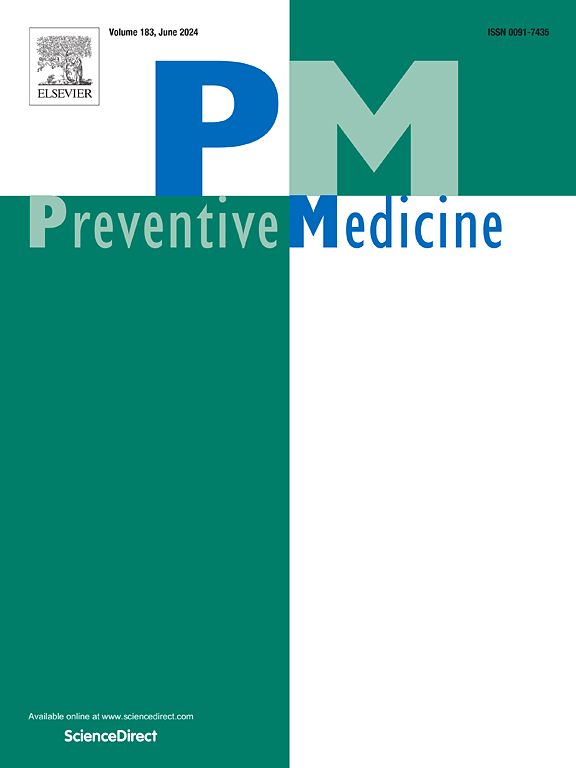促进成人体育锻炼的经济激励措施:系统回顾和荟萃分析更新。
IF 3.2
2区 医学
Q1 MEDICINE, GENERAL & INTERNAL
引用次数: 0
摘要
目的:为经济激励对成人体育锻炼(PA)的影响提供最新证据。方法:系统检索9个数据库(Medline、EMBASE、PsychINFO、Scopus、Web of Science、CINAHL、EconLit、SPORTDiscus和Cochrane),以确定2018年6月1日至2024年3月31日发表的随机对照试验(rct)和试点rct,检查FI-for-PA干预措施。结果:29项研究(n = 21项随机对照试验,n = 8项试点随机对照试验;FI大小中位数 = $1.19美元/天),共纳入9604名参与者(60.8% %为女性,平均年龄 = 42.7 岁)。21项研究中有17项报告了积极的短期效果。5项研究中的5项和8项研究中的3项分别报告了积极的长期和随访效果。在每日步数荟萃分析(最常报道的PA结果)中纳入的15项研究中,FI在短期干预中具有中等影响(标准化平均差[SMD][95 % CI] = 0.52 [0.25-0.78],p )。结论:在6年的时间跨度内确定了29项研究。短期FI干预增加PA。对每日步数的影响具有临床意义(≥1000步/天)。关键背景因素调节作用。关于长期和随访效果的证据有限。本文章由计算机程序翻译,如有差异,请以英文原文为准。
Financial incentives for physical activity in adults: Systematic review and meta-analysis update
Objective
To update the evidence on the effects of financial incentives (FI) on physical activity (PA) in adults.
Methods
A systematic search of nine databases (Medline, EMBASE, PsychINFO, Scopus, Web of Science, CINAHL, EconLit, SPORTDiscus, and Cochrane) was conducted to identify randomised controlled trials (RCTs) and pilot RCTs published between June 1, 2018 and March 31, 2024 examining FI-for-PA interventions. ‘Vote counting’ and random-effects meta-analyses assessed short- (<6 months) and long-term (≥6 months) FI effects, as well as impact during follow-up (incentive withdrawal). Meta-regressions examined moderator effects.
Results
Twenty-nine studies (n = 21 RCT, n = 8 pilot RCTs; median FI size = $1.19 USD/day) involving 9604 participants were included (60.8 % female, mean age = 42.7 years). 17 of 21 studies reported positive short-term effects. 5 of 5 and 3 of 8 studies, respectively, reported positive long-term and follow-up effects. Among the 15 studies included in daily step count meta-analyses (most commonly reported PA outcome), FI had a moderate effect during short-term interventions (standardized mean difference [SMD] [95 % CI] = 0.52 [0.25–0.78], p < 0.001) and a small effect in follow-up (SMD [95 % CI] = 0.20 [0.01–0.40], p = 0.04). Too few long-term studies reported daily step count to conduct pooled analyses (n = 1). Meta-regressions suggest study length, incentive size, wearable device-use, and goal setting moderate FI effects (p < 0.05).
Conclusions
Twenty-nine studies were identified over a 6-year span. Short-term FI interventions increase PA. The impact on daily step count is clinically significant (≥1000 steps/day). Key contextual factors moderate effects. Evidence is limited regarding long-term and follow-up effects.
求助全文
通过发布文献求助,成功后即可免费获取论文全文。
去求助
来源期刊

Preventive medicine
医学-公共卫生、环境卫生与职业卫生
CiteScore
7.70
自引率
3.90%
发文量
0
审稿时长
42 days
期刊介绍:
Founded in 1972 by Ernst Wynder, Preventive Medicine is an international scholarly journal that provides prompt publication of original articles on the science and practice of disease prevention, health promotion, and public health policymaking. Preventive Medicine aims to reward innovation. It will favor insightful observational studies, thoughtful explorations of health data, unsuspected new angles for existing hypotheses, robust randomized controlled trials, and impartial systematic reviews. Preventive Medicine''s ultimate goal is to publish research that will have an impact on the work of practitioners of disease prevention and health promotion, as well as of related disciplines.
 求助内容:
求助内容: 应助结果提醒方式:
应助结果提醒方式:


